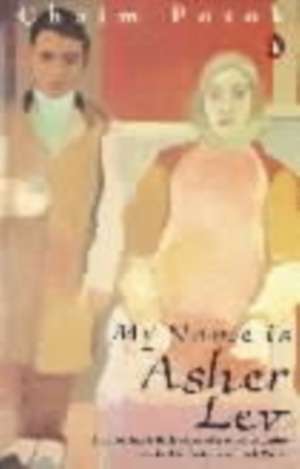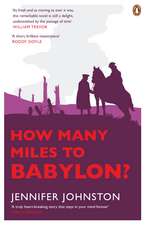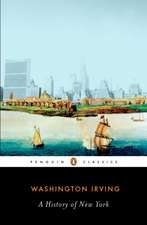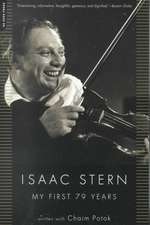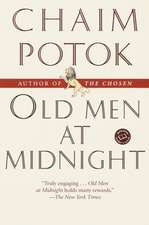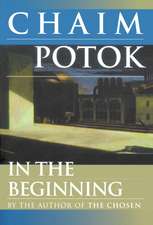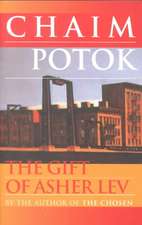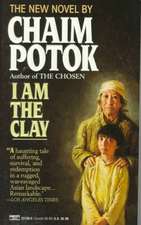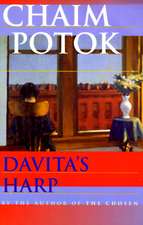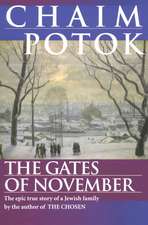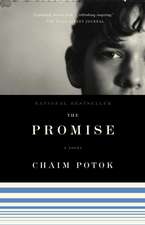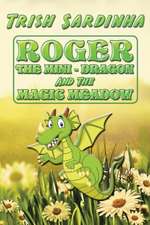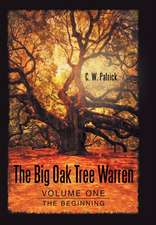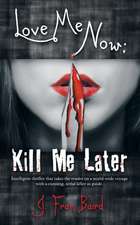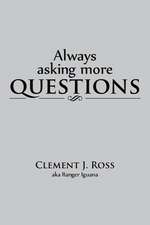My Name is Asher Lev
Autor Chaim Potoken Limba Engleză Paperback – 24 apr 1974
| Toate formatele și edițiile | Preț | Express |
|---|---|---|
| Paperback (3) | 58.60 lei 26-32 zile | +21.21 lei 10-14 zile |
| Penguin Books – 24 apr 1974 | 58.60 lei 26-32 zile | +21.21 lei 10-14 zile |
| Penguin Books – 4 noi 2009 | 63.80 lei 3-5 săpt. | +10.17 lei 10-14 zile |
| Anchor Books – 28 feb 2003 | 99.83 lei 3-5 săpt. |
Preț: 58.60 lei
Preț vechi: 69.86 lei
-16% Nou
Puncte Express: 88
Preț estimativ în valută:
11.21€ • 11.74$ • 9.28£
11.21€ • 11.74$ • 9.28£
Carte disponibilă
Livrare economică 20-26 martie
Livrare express 04-08 martie pentru 31.20 lei
Preluare comenzi: 021 569.72.76
Specificații
ISBN-13: 9780140036428
ISBN-10: 0140036423
Pagini: 320
Dimensiuni: 129 x 198 x 18 mm
Greutate: 0.24 kg
Editura: Penguin Books
Colecția Penguin
Locul publicării:London, United Kingdom
ISBN-10: 0140036423
Pagini: 320
Dimensiuni: 129 x 198 x 18 mm
Greutate: 0.24 kg
Editura: Penguin Books
Colecția Penguin
Locul publicării:London, United Kingdom
Notă biografică
Chaim Potok
Extras
One
My name is Asher Lev, the Asher Lev, about whom you have read in newspapers and magazines, about whom you talk so much at your dinner affairs and cocktail parties, the notorious and legendary Lev of the Brooklyn Crucifixion.
I am an observant Jew. Yes, of course, observant Jews do not paint crucifixions. As a matter of fact, observant Jews do not paint at all--in the way that I am painting. So strong words are being written and spoken about me, myths are being generated: I am a traitor, an apostate, a self-hater, an inflicter of shame upon my family, my friends, my people; also, I am a mocker of ideas sacred to Christians, a blasphemous manipulator of modes and forms revered by Gentiles for two thousand years.
Well, I am none of those things. And yet, in all honesty, I confess that my accusers are not altogether wrong: I am indeed, in some way, all of those things.
The fact is that gossip, rumors, mythmaking, and news stories are not appropriate vehicles for the communication of nuances of truth, those subtle tonalities that are often the truly crucial elements in a causal chain. So it is time for the defense, for a long session in demythology. But I will not apologize. It is absurd to apologize for a mystery.
And that is what it has been all along--a mystery, of the sort theologians have in mind when they talk about concepts like wonder and awe. Certainly it began as a mystery, for nowhere in my family background was there any indication that I might have come into the world with a unique and disquieting gift. My father was able to trace his family line down through the centuries to the time of the Black Death in 1347, which destroyed about half the population of Europe. My father's great-great-grandfather was in his early years the manager of the vast estates of a carousing Russian nobleman who when drunk sometimes killed serfs; once, in an act of wild drunkenness, he burned down a village and people died. You see how a goy behaves, I would be told by my father and mother. The people of the sitra achra behave this way. They are evil and from the Other Side. Jews do not behave this way. My father's great-great-grandfather had transformed those estates into a source of immense wealth for his employer as well as himself. In his middle years, he began to travel. Why did he travel so much? I would ask. To do good deeds and bring the Master of the Universe into the world, my father would respond. To find people in need and to comfort and help them, my mother would say. I was told about him so often during my very early years that he began to appear quite frequently in my dreams: a man of mythic dimensions, tall, dark-bearded, powerful of mind and body; a brilliant entrepreneur; a beneficent supporter of academies of learning; a legendary traveler, and author of the Hebrew work Journeys to Distant Lands. That great man would come to me in my dreams and echo my father's queries about the latest bare wall I had decorated and the sacred margins I had that day filled with drawings. It was no joy waking up after a dream about that man. He left a taste of thunder in my mouth.
My father's father, the man whose name I bear, was a scholar and recluse in his early and middle years, a dweller in the study halls of synagogues and academies. He was never described to me, but I pictured him as slight of body and huge of head, with eyelids swollen from lack of sleep, face pale, lips dry, the veins showing blue along his cheeks and temples. In his youth, he earned the name "ilui," genius, a term not lightly bestowed by the Jews of Eastern Europe. And by the time he was twenty he had come to be known as the Genius of Mozyr, after the Russian town in which he lived. Shortly before his fiftieth birthday, he abruptly and mysteriously left Mozyr and, with his wife and children, journeyed to Ladov and became a member of the Russian Hasidic sect led by the Rebbe of Ladov. He began to travel throughout the Soviet Union as an emissary of the Rebbe. Why did he travel so much? I once asked. To bring the Master of the Universe into the world, my father replied. To find people who needed help, my mother said. While on his way home from the Rebbe's synagogue late one Saturday night, he was killed by a drunken axe-wielding peasant. Somehow my grandfather had forgotten it was the night before Easter.
My mother came from a family of leading Sadegerer Hasidim, pious Jews who had been followers of the great Eastern European Hasidic dynasty established by Israel of Rizhin. On her father's side, my mother could trace her family back to the Rebbe of Berdichev, one of the saintliest of Hasidic leaders. On her mother's side, the family line consisted of great scholars down to the Chmelnitzki massacres in seventeenth-century Poland, where it vanished in blood and death.
So, little Asher Lev--born in 1943 to Rivkeh and Aryeh Lev, in the section of Brooklyn known as Crown Heights--little Asher Lev was the juncture point of two significant family lines, the apex, as it were, of a triangle seminal with Jewish potentiality and freighted with Jewish responsibility. But he was also born with a gift.
I have no recollection of when I began to use that gift. But I can remember, at the age of four, holding my pencil in the firm fist grip of a child and transferring the world around me to pieces of paper, margins of books, bare expanses of wall. I remember drawing the contours of that world: my narrow room, with the bed, the paint-it-yourself bureau and desk and chair, the window overlooking the cemented back yard; our apartment, with its white walls and rug-covered floors and the large framed picture of the Rebbe near the living-room window; the wide street that was Brooklyn Parkway, eight lanes of traffic, the red brick and white stone of the apartment houses, the neat cement squares of the sidewalks, the occasional potholes in the asphalt; the people of the street, bearded men, old women gossiping on the benches beneath the trees, little boys in skullcaps and sidecurls, young wives in long-sleeved dresses and fancy wigs--all the married women of our group concealed their natural hair beneath wigs for reasons of modesty. I grew up encrusted with lead and spectrumed with crayons. My dearest companions were Eberhard and Crayola. Washing for meals was a cosmic enterprise.
I remember drawing my mother. Born and raised in Crown Heights, her family high in the ranks of the Ladover aristocracy, she had gone through the Ladover school system for girls, and had married my father one week after her graduation from high school. She was nineteen when I was born and seemed more a sister to me than a mother.
I remember my first drawings of my mother's face--longish straight nose, clear brown eyes, high-boned cheeks. She was small and slight; her arms were thin and smooth-skinned, her fingers long and thin and delicately boned. Her face was smooth and smelled of soap. I loved her face next to mine when she listened to me recite the Krias Shema before I closed my eyes to go to sleep.
I remember those early years of my life, those first years of my efforts with pens and pencils and crayons. They were very happy years; laughter came easily both to me and to my mother. We played. We took long walks. She was a gentle big sister.
I drew her walking with me along Brooklyn Parkway, her coat collar up around her chin, her cheeks flushed in a high autumn wind--two roundish spots of bright pink against the smooth fair skin of her face. In the winter, I drew her tossing snowballs at the trees that lined the wide parkway, her arm motions like those of a little girl. Often we ran through the drifts together, kicking up the snow with our galoshes, and I drew that, too.
"Oh, how pretty," she said to me once, looking at a drawing of herself jumping over a snowbank. "Oh, I like this one, Asher. You made the snow very pretty. And so high. What a jump! Did I jump like that? I'm almost flying."
In the spring, we sometimes went rowing in Prospect Park, not far from where we lived. She was an awkward rower, and she would laugh nervously whenever she fell backward off her seat from a skimming pull at the oars. But we went anyway, and often I took my crayons and pad with me and drew her as she rowed, and drew, too, the look of the water beneath the sky and the surface movements stirred up by her erratic oars.
"Asher, it isn't nice to draw your mama like this."
"But it was the time you fell in the boat, Mama."
"It isn't nice. It isn't respectful. But the shore is very pretty. How did you do that?"
"I used sand from the beach, Mama. Can you see the sand?"
And in the summer I drew her in her light long-sleeved blouses, with the tiny beads of perspiration on her upper lip and brow. Her dresses and blouses were always long-sleeved, for out of modesty the women of our group never wore short-sleeved garments--and she perspired a great deal in the heat, especially on our walks together.
"What is that on my face?" she asked, looking at one of my summer drawings of us walking through the Brooklyn Botanical Gardens.
"Those are the spots, Mama."
"What spots, Asher?"
"The wet spots, Mama. When it's hot, there are the wet spots."
After a moment she said, "But why didn't you draw the pretty birds, Asher? And the flowers, Asher, why didn't you draw the flowers?"
In the very early years, before my mother became ill, my father traveled a great deal.
I asked him once during breakfast, "Is my papa going away again today?"
"To Ottawa," he said, not looking up from his New York Times.
"Where is Ottawa?"
"Ottawa is a very important city in Canada." He spoke with a faint Russian accent.
"Canada is a country next to America," my mother explained.
"Why is my papa going to Ottawa?"
"To meet with people in the government," my mother said proudly.
"Why?"
My father looked up from the newspaper. "The Rebbe asked me to go."
He had been brought to America at the age of fourteen, together with his mother and older brother, and had been twenty-five when I was born. He was a graduate of the Ladover yeshiva in the Crown Heights section of Brooklyn. He had earned a bachelor's degree in political science from Brooklyn College and a master's degree in the same subject from New York University. He had earned those degrees at the request of the Rebbe.
He was tall and thick-shouldered. His eyes were sharp, direct, and dark. His untrimmed beard was red, as was the hair on his head. He kept his sidecurls tucked behind his ears. It was from him that I inherited my red hair and dark eyes. My slight features and thinness of build I inherited from my mother.
I came into the kitchen one morning and found him preparing the orange juice. He had his own way of making our orange juice: each of us received the juice of one orange, half a glass of cold water, and a teaspoonful of sugar. It was a refreshing drink to wake up to every morning. Sometimes I was able to determine from the way he prepared the orange juice whether or not he would be traveling that day.
He was in a hurry that morning, so I knew he would be traveling.
"Good morning," I said. "Is my papa traveling again today for the Rebbe?"
"Good morning, Asher. Did you say Modeh Ani?"
"Yes, Papa."
"Sit down. I'll make you your orange juice."
I sat down. My mother was putting dry cereal on the table.
"Your papa is going to Washington today," my mother said.
"What is Washington?"
"The city where the government of America is."
"My papa is traveling to Washington for the Rebbe?"
"Yes," my mother said. She took great pride in my father's missions for the Rebbe.
"Why does my papa travel for the Rebbe?"
My father poured orange juice into my glass. "My father traveled for the Rebbe's father, may they both rest in peace. I travel for the Rebbe. It is a great honor to be able to travel for the Rebbe."
"What does my papa do when he travels for the Rebbe?"
"So many questions," my father said. "Drink your juice, Asher. The vitamins will go away if you let it stay too long."
Sometimes he left after supper. Most of the time, he left after breakfast. My mother and I would go with him to the door.
"Have a safe journey," my mother would say. And she would add, in Yiddish, "Go in health and return in health."
They would not embrace. They never embraced in my presence.
My father would kiss me, take his black leather bag and his attache case, and leave. Sometimes I would go to the living-room window and see him come out of our apartment house and hail a cab, or watch him walk toward the building that was the international headquarters of the Ladover movement a block and a half away. I would watch him walking quickly beneath the trees along Brooklyn Parkway, the black leather bag and attache case in his hands, a copy of the New York Times under his arm--a tall, broad-shouldered, red-bearded, neatly dressed man in a dark suit and coat and narrow-brimmed hat, walking with the very faintest of limps from the polio he had been stricken with as a child in Soviet Russia.
I drew him often during those very early years. I drew him as he sat evenings with my mother, reading or talking. I drew him drinking coffee with my mother at the kitchen table. Sometimes I would wake in the night and hear them in the kitchen. Often they sat at that table late into the night, drinking coffee and talking. And I would lie in my bed, wondering what they were saying.
I drew my memory of my father and me walking together to our synagogue. He was so tall and I was so short, and he would incline his head toward me as we walked. I drew him as he prayed at home in his prayer shawl and tefillin on those weekday mornings when for some reason he could not go to the synagogue. He would stand at our living-room window, his head covered with the prayer shawl, swaying faintly back and forth, with only the edge of his red beard protruding from the white black-striped shawl.
My name is Asher Lev, the Asher Lev, about whom you have read in newspapers and magazines, about whom you talk so much at your dinner affairs and cocktail parties, the notorious and legendary Lev of the Brooklyn Crucifixion.
I am an observant Jew. Yes, of course, observant Jews do not paint crucifixions. As a matter of fact, observant Jews do not paint at all--in the way that I am painting. So strong words are being written and spoken about me, myths are being generated: I am a traitor, an apostate, a self-hater, an inflicter of shame upon my family, my friends, my people; also, I am a mocker of ideas sacred to Christians, a blasphemous manipulator of modes and forms revered by Gentiles for two thousand years.
Well, I am none of those things. And yet, in all honesty, I confess that my accusers are not altogether wrong: I am indeed, in some way, all of those things.
The fact is that gossip, rumors, mythmaking, and news stories are not appropriate vehicles for the communication of nuances of truth, those subtle tonalities that are often the truly crucial elements in a causal chain. So it is time for the defense, for a long session in demythology. But I will not apologize. It is absurd to apologize for a mystery.
And that is what it has been all along--a mystery, of the sort theologians have in mind when they talk about concepts like wonder and awe. Certainly it began as a mystery, for nowhere in my family background was there any indication that I might have come into the world with a unique and disquieting gift. My father was able to trace his family line down through the centuries to the time of the Black Death in 1347, which destroyed about half the population of Europe. My father's great-great-grandfather was in his early years the manager of the vast estates of a carousing Russian nobleman who when drunk sometimes killed serfs; once, in an act of wild drunkenness, he burned down a village and people died. You see how a goy behaves, I would be told by my father and mother. The people of the sitra achra behave this way. They are evil and from the Other Side. Jews do not behave this way. My father's great-great-grandfather had transformed those estates into a source of immense wealth for his employer as well as himself. In his middle years, he began to travel. Why did he travel so much? I would ask. To do good deeds and bring the Master of the Universe into the world, my father would respond. To find people in need and to comfort and help them, my mother would say. I was told about him so often during my very early years that he began to appear quite frequently in my dreams: a man of mythic dimensions, tall, dark-bearded, powerful of mind and body; a brilliant entrepreneur; a beneficent supporter of academies of learning; a legendary traveler, and author of the Hebrew work Journeys to Distant Lands. That great man would come to me in my dreams and echo my father's queries about the latest bare wall I had decorated and the sacred margins I had that day filled with drawings. It was no joy waking up after a dream about that man. He left a taste of thunder in my mouth.
My father's father, the man whose name I bear, was a scholar and recluse in his early and middle years, a dweller in the study halls of synagogues and academies. He was never described to me, but I pictured him as slight of body and huge of head, with eyelids swollen from lack of sleep, face pale, lips dry, the veins showing blue along his cheeks and temples. In his youth, he earned the name "ilui," genius, a term not lightly bestowed by the Jews of Eastern Europe. And by the time he was twenty he had come to be known as the Genius of Mozyr, after the Russian town in which he lived. Shortly before his fiftieth birthday, he abruptly and mysteriously left Mozyr and, with his wife and children, journeyed to Ladov and became a member of the Russian Hasidic sect led by the Rebbe of Ladov. He began to travel throughout the Soviet Union as an emissary of the Rebbe. Why did he travel so much? I once asked. To bring the Master of the Universe into the world, my father replied. To find people who needed help, my mother said. While on his way home from the Rebbe's synagogue late one Saturday night, he was killed by a drunken axe-wielding peasant. Somehow my grandfather had forgotten it was the night before Easter.
My mother came from a family of leading Sadegerer Hasidim, pious Jews who had been followers of the great Eastern European Hasidic dynasty established by Israel of Rizhin. On her father's side, my mother could trace her family back to the Rebbe of Berdichev, one of the saintliest of Hasidic leaders. On her mother's side, the family line consisted of great scholars down to the Chmelnitzki massacres in seventeenth-century Poland, where it vanished in blood and death.
So, little Asher Lev--born in 1943 to Rivkeh and Aryeh Lev, in the section of Brooklyn known as Crown Heights--little Asher Lev was the juncture point of two significant family lines, the apex, as it were, of a triangle seminal with Jewish potentiality and freighted with Jewish responsibility. But he was also born with a gift.
I have no recollection of when I began to use that gift. But I can remember, at the age of four, holding my pencil in the firm fist grip of a child and transferring the world around me to pieces of paper, margins of books, bare expanses of wall. I remember drawing the contours of that world: my narrow room, with the bed, the paint-it-yourself bureau and desk and chair, the window overlooking the cemented back yard; our apartment, with its white walls and rug-covered floors and the large framed picture of the Rebbe near the living-room window; the wide street that was Brooklyn Parkway, eight lanes of traffic, the red brick and white stone of the apartment houses, the neat cement squares of the sidewalks, the occasional potholes in the asphalt; the people of the street, bearded men, old women gossiping on the benches beneath the trees, little boys in skullcaps and sidecurls, young wives in long-sleeved dresses and fancy wigs--all the married women of our group concealed their natural hair beneath wigs for reasons of modesty. I grew up encrusted with lead and spectrumed with crayons. My dearest companions were Eberhard and Crayola. Washing for meals was a cosmic enterprise.
I remember drawing my mother. Born and raised in Crown Heights, her family high in the ranks of the Ladover aristocracy, she had gone through the Ladover school system for girls, and had married my father one week after her graduation from high school. She was nineteen when I was born and seemed more a sister to me than a mother.
I remember my first drawings of my mother's face--longish straight nose, clear brown eyes, high-boned cheeks. She was small and slight; her arms were thin and smooth-skinned, her fingers long and thin and delicately boned. Her face was smooth and smelled of soap. I loved her face next to mine when she listened to me recite the Krias Shema before I closed my eyes to go to sleep.
I remember those early years of my life, those first years of my efforts with pens and pencils and crayons. They were very happy years; laughter came easily both to me and to my mother. We played. We took long walks. She was a gentle big sister.
I drew her walking with me along Brooklyn Parkway, her coat collar up around her chin, her cheeks flushed in a high autumn wind--two roundish spots of bright pink against the smooth fair skin of her face. In the winter, I drew her tossing snowballs at the trees that lined the wide parkway, her arm motions like those of a little girl. Often we ran through the drifts together, kicking up the snow with our galoshes, and I drew that, too.
"Oh, how pretty," she said to me once, looking at a drawing of herself jumping over a snowbank. "Oh, I like this one, Asher. You made the snow very pretty. And so high. What a jump! Did I jump like that? I'm almost flying."
In the spring, we sometimes went rowing in Prospect Park, not far from where we lived. She was an awkward rower, and she would laugh nervously whenever she fell backward off her seat from a skimming pull at the oars. But we went anyway, and often I took my crayons and pad with me and drew her as she rowed, and drew, too, the look of the water beneath the sky and the surface movements stirred up by her erratic oars.
"Asher, it isn't nice to draw your mama like this."
"But it was the time you fell in the boat, Mama."
"It isn't nice. It isn't respectful. But the shore is very pretty. How did you do that?"
"I used sand from the beach, Mama. Can you see the sand?"
And in the summer I drew her in her light long-sleeved blouses, with the tiny beads of perspiration on her upper lip and brow. Her dresses and blouses were always long-sleeved, for out of modesty the women of our group never wore short-sleeved garments--and she perspired a great deal in the heat, especially on our walks together.
"What is that on my face?" she asked, looking at one of my summer drawings of us walking through the Brooklyn Botanical Gardens.
"Those are the spots, Mama."
"What spots, Asher?"
"The wet spots, Mama. When it's hot, there are the wet spots."
After a moment she said, "But why didn't you draw the pretty birds, Asher? And the flowers, Asher, why didn't you draw the flowers?"
In the very early years, before my mother became ill, my father traveled a great deal.
I asked him once during breakfast, "Is my papa going away again today?"
"To Ottawa," he said, not looking up from his New York Times.
"Where is Ottawa?"
"Ottawa is a very important city in Canada." He spoke with a faint Russian accent.
"Canada is a country next to America," my mother explained.
"Why is my papa going to Ottawa?"
"To meet with people in the government," my mother said proudly.
"Why?"
My father looked up from the newspaper. "The Rebbe asked me to go."
He had been brought to America at the age of fourteen, together with his mother and older brother, and had been twenty-five when I was born. He was a graduate of the Ladover yeshiva in the Crown Heights section of Brooklyn. He had earned a bachelor's degree in political science from Brooklyn College and a master's degree in the same subject from New York University. He had earned those degrees at the request of the Rebbe.
He was tall and thick-shouldered. His eyes were sharp, direct, and dark. His untrimmed beard was red, as was the hair on his head. He kept his sidecurls tucked behind his ears. It was from him that I inherited my red hair and dark eyes. My slight features and thinness of build I inherited from my mother.
I came into the kitchen one morning and found him preparing the orange juice. He had his own way of making our orange juice: each of us received the juice of one orange, half a glass of cold water, and a teaspoonful of sugar. It was a refreshing drink to wake up to every morning. Sometimes I was able to determine from the way he prepared the orange juice whether or not he would be traveling that day.
He was in a hurry that morning, so I knew he would be traveling.
"Good morning," I said. "Is my papa traveling again today for the Rebbe?"
"Good morning, Asher. Did you say Modeh Ani?"
"Yes, Papa."
"Sit down. I'll make you your orange juice."
I sat down. My mother was putting dry cereal on the table.
"Your papa is going to Washington today," my mother said.
"What is Washington?"
"The city where the government of America is."
"My papa is traveling to Washington for the Rebbe?"
"Yes," my mother said. She took great pride in my father's missions for the Rebbe.
"Why does my papa travel for the Rebbe?"
My father poured orange juice into my glass. "My father traveled for the Rebbe's father, may they both rest in peace. I travel for the Rebbe. It is a great honor to be able to travel for the Rebbe."
"What does my papa do when he travels for the Rebbe?"
"So many questions," my father said. "Drink your juice, Asher. The vitamins will go away if you let it stay too long."
Sometimes he left after supper. Most of the time, he left after breakfast. My mother and I would go with him to the door.
"Have a safe journey," my mother would say. And she would add, in Yiddish, "Go in health and return in health."
They would not embrace. They never embraced in my presence.
My father would kiss me, take his black leather bag and his attache case, and leave. Sometimes I would go to the living-room window and see him come out of our apartment house and hail a cab, or watch him walk toward the building that was the international headquarters of the Ladover movement a block and a half away. I would watch him walking quickly beneath the trees along Brooklyn Parkway, the black leather bag and attache case in his hands, a copy of the New York Times under his arm--a tall, broad-shouldered, red-bearded, neatly dressed man in a dark suit and coat and narrow-brimmed hat, walking with the very faintest of limps from the polio he had been stricken with as a child in Soviet Russia.
I drew him often during those very early years. I drew him as he sat evenings with my mother, reading or talking. I drew him drinking coffee with my mother at the kitchen table. Sometimes I would wake in the night and hear them in the kitchen. Often they sat at that table late into the night, drinking coffee and talking. And I would lie in my bed, wondering what they were saying.
I drew my memory of my father and me walking together to our synagogue. He was so tall and I was so short, and he would incline his head toward me as we walked. I drew him as he prayed at home in his prayer shawl and tefillin on those weekday mornings when for some reason he could not go to the synagogue. He would stand at our living-room window, his head covered with the prayer shawl, swaying faintly back and forth, with only the edge of his red beard protruding from the white black-striped shawl.
Recenzii
“A novel of finely articulated tragic power. . . . Little short of a work of genius.” --The New York Times Book Review
“Memorable. . . . Profound in its vision of humanity, of religion, and of art.”--The Wall Street Journal
“Such a feeling of freshness, of something brand-new. . . . Attention-holding and ultimately moving.” --The New York Times
“Engrossing and illuminating.” --Miami Herald
“Memorable. . . . Profound in its vision of humanity, of religion, and of art.”--The Wall Street Journal
“Such a feeling of freshness, of something brand-new. . . . Attention-holding and ultimately moving.” --The New York Times
“Engrossing and illuminating.” --Miami Herald
